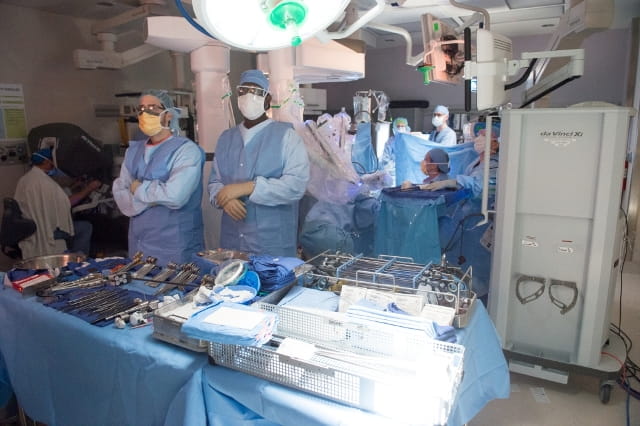New da Vinci Xi robotic system benefits patients, surgeons

In spring 2015, Lankenau Medical Center became the first hospital in the Philadelphia suburbs to offer the da Vinci Xi robotic system, the latest in minimally invasive surgical treatment options.
“We are constantly looking for ways to improve the treatment experience for our patients, from surgery to recovery. The da Vinci Xi robotic system is the most advanced technology available for the treatment of a variety of complex diseases,” explains Patrick Ross Jr., MD, PhD, chairman of the department of surgery, Main Line Health.
These complex diseases now include advanced cardiac thoracic, colorectal, general, urologic and gynecologic surgery.
How it works
Talk of robotic equipment can have many patients confused, and wondering: Who’s really going to be performing my surgery—a robot or a surgeon?
"At all times, it is under the control of your surgeon, but the system allows us to perform the surgery with greater precision,” explains Dr. Ross.
Once patients are prepared for surgery, a surgeon will make a series of small incisions on the patient’s body through which they can operate the robot. The robotic instrumentation is used in place of traditional open surgical approaches. Rather than a surgeon’s hands, the system works by translating their hand movement’s on the device’s controls into smaller, more precise actions that are performed by the robot’s four arms.
“Surgeons actually prefer the use of the da Vinci system, because it allows for a greater range of motion and more freedom than we have when we’re bending or rotating the wrist during traditional surgery,” says Dr. Ross.
Benefits for patients
In addition to its ease of use for surgeons, the da Vinci Xi robotic system also offers a number of benefits for patients, including shorter hospital stays, less blood loss, decreased post-operative pain, and a faster recovery.
“These benefits to the patient are largely due to the fact the operations are minimally invasive,” explains Dr. Ross.
Although the da Vinci system is not appropriate for every patient, Dr. Ross says that an increasing number of patients are a candidate to receive surgery via the robotic approach.
“The majority of our thoracic surgeries can be performed with the da Vinci Xi robot, and we want to be able to offer these benefits to as many patients as possible,” he says.
To schedule an appointment with a specialist at Main Line Health, call 1.866.CALL.MLH (1.866.225.5654).
 Content you want, delivered to your inbox
Content you want, delivered to your inbox
Want to get the latest health and wellness articles delivered right to your inbox?
Subscribe to the Well Ahead Newsletter.
